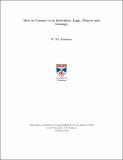Files in this item
How to commit to an individual : logic, objects and ontology
Item metadata
| dc.contributor.advisor | Sullivan, Peter M. | |
| dc.contributor.author | Janssen, F. M. | |
| dc.coverage.spatial | 185 | en_US |
| dc.date.accessioned | 2014-03-14T09:35:56Z | |
| dc.date.available | 2014-03-14T09:35:56Z | |
| dc.date.issued | 2014-06-26 | |
| dc.identifier.uri | https://hdl.handle.net/10023/4527 | |
| dc.description.abstract | In this thesis I propose an improved theory of ontological commitment, one which is neutral on epistemology. Although Quine's quantificational criterion of ontological commitment has many advantages over its competitors, like its univocal treatment of being and existence, its clear account of ontological reduction and its capacity to accommodate implicit commitments, I argue that it has a fatal flaw: the inability to account for ontological commitment to individuals. Quine's choice of a first-order language of regimentation without constants is so entwined with his holist epistemology that imputations of existence cannot be made except to objects-qua-F, qua some wholly third-personal description. Commitments of those who believe that minds reach out directly to objects by means of acquaintance or introspection, encoded in language by constants, are ungrammatical in Quine's language. This breakdown of grammaticality, on my view, is an avoidable result of Quine's behaviourism and holist epistemology filtering into his choice of canonical language. I opt for a broader conception of ontological commitments as incurred by formalised theories with one or more semantic categories of categorematic objectual expressions, whose function is to stand for objects. I expand the language of regimentation at least to first-order logic with constants and identity. This preserves the attractive features of Quine's position. It retains its elegant treatment of reduction and implicit ontological commitments, and its capacity to explain away Meinongian confusions, without being beholden to global holism. My canonical language makes room for acquaintance and first-personal methods as sources of ontological commitment. It has the advantage of allowing theories like Quine's, which confine themselves to objects-qua-F, to be regimented as well as non-holist theories whose criteria of ontological commitment are 'to be is to be the referent of a name' or 'to be is to be the value of a constant or variable'. | en_US |
| dc.language.iso | en | en_US |
| dc.publisher | University of St Andrews | |
| dc.subject | Ontology | en_US |
| dc.subject | Philosophy of logic | en_US |
| dc.subject | W. V. Quine | en_US |
| dc.subject.lcc | BD311.J2 | |
| dc.subject.lcsh | Logic | en |
| dc.subject.lcsh | Ontology | en |
| dc.subject.lcsh | Quine, W. V. (Willard Van Orman) | en |
| dc.title | How to commit to an individual : logic, objects and ontology | en_US |
| dc.type | Thesis | en_US |
| dc.contributor.sponsor | Arts and Humanities Research Council (AHRC) | en_US |
| dc.type.qualificationlevel | Doctoral | en_US |
| dc.type.qualificationname | PhD Doctor of Philosophy | en_US |
| dc.publisher.institution | The University of St Andrews | en_US |
This item appears in the following Collection(s)
Items in the St Andrews Research Repository are protected by copyright, with all rights reserved, unless otherwise indicated.

